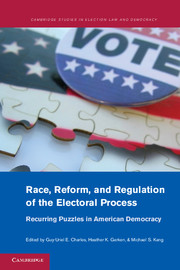Book contents
- Frontmatter
- Contents
- Figures
- Tables
- Contributors
- Preface
- Introduction: The Future of Elections Scholarship
- PART I RACE AND POLITICS
- PART II COURTS AND THE REGULATION OF THE ELECTORAL PROCESS
- Overview: Mapping Election Law's Interior
- 4 The Institutional Turn in Election Law Scholarship
- 5 Judges as Political Regulators
- 6 Empirical Legitimacy and Election Law
- 7 Judging Democracy's Boundaries
- PART III ELECTION PERFORMANCE AND REFORM
- PART IV CONCLUSION
- Index
- References
6 - Empirical Legitimacy and Election Law
Published online by Cambridge University Press: 01 June 2011
- Frontmatter
- Contents
- Figures
- Tables
- Contributors
- Preface
- Introduction: The Future of Elections Scholarship
- PART I RACE AND POLITICS
- PART II COURTS AND THE REGULATION OF THE ELECTORAL PROCESS
- Overview: Mapping Election Law's Interior
- 4 The Institutional Turn in Election Law Scholarship
- 5 Judges as Political Regulators
- 6 Empirical Legitimacy and Election Law
- 7 Judging Democracy's Boundaries
- PART III ELECTION PERFORMANCE AND REFORM
- PART IV CONCLUSION
- Index
- References
Summary
INTRODUCTION
Worries about public confidence in the basic institutions of the political order have been a recurring theme of the Supreme Court's constitutional election law jurisprudence. They seem to inform the Court's articulation of constitutional rights; its understanding of the state interests that may justify burdens on such rights; and the development of prudential limitations on judicial involvement in electoral disputes, such as the political question doctrine. To date, however, the Court's confidence-minded decisions have turned entirely on judicial guesswork about the functional relationships of interest. The Court has simply assumed, for example, that campaign-contribution restrictions will inspire confidence among citizens who would otherwise believe the electoral process corrupted by moneyed interests. The Court has also relied on rank conjectures about the consequences of perceived corruption of the electoral process. In Purcell v. Gonzalez (2006), for example, the Court posited that “honest citizens” who believe that voter fraud is common will be “drive[n] out of the democratic process.”
The jurisprudence of public confidence is on a collision course with recent developments in political science. Findings from new survey research cast doubt on some of the Supreme Court's most important conjectures, while also hinting at the possibility that seemingly unexceptional features of the electoral practices may prove constitutionally vulnerable – if the Court is serious about the idea that constitutional political rights derive their shape in part from what the citizenry deems important to the legitimacy of the political order.
- Type
- Chapter
- Information
- Race, Reform, and Regulation of the Electoral ProcessRecurring Puzzles in American Democracy, pp. 117 - 149Publisher: Cambridge University PressPrint publication year: 2011

